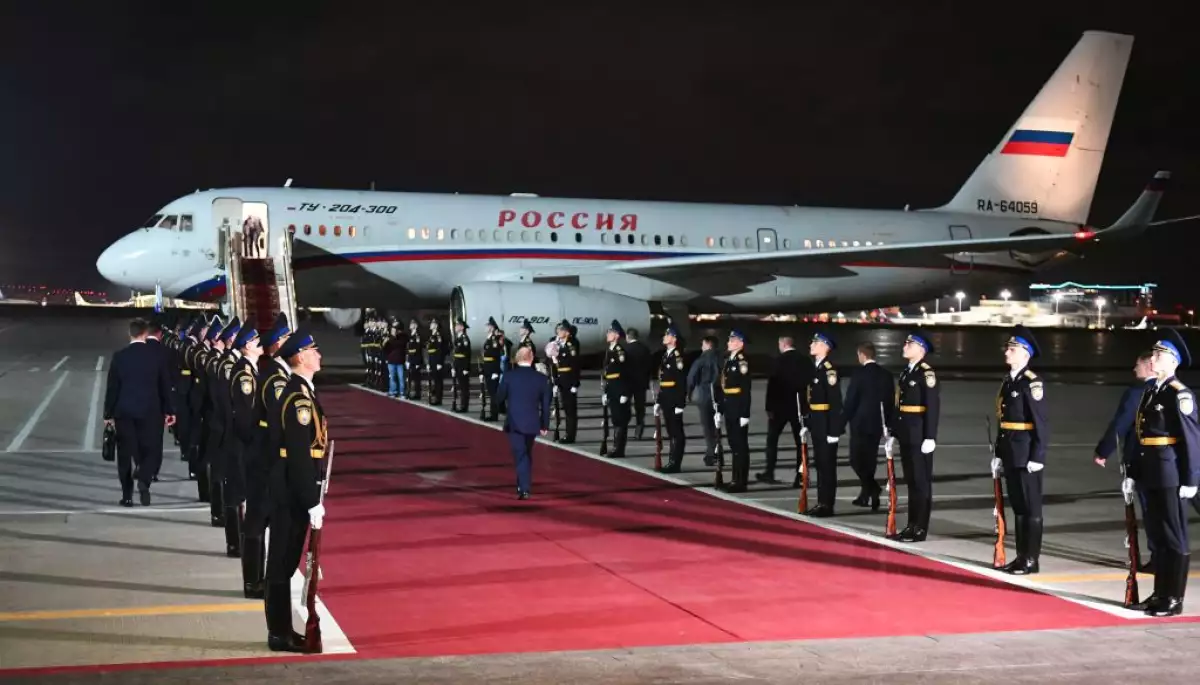

Українською читайте тут.
The United States and Germany, with the assistance of their allies on the one hand and Russia on the other, conducted a historic prisoner exchange The exchange involved 26 prisoners from the United States, Germany, Poland, Slovenia, Norway, Russia, and Belarus. During the operation, 10 people, including two children, were sent to Russia, 13 to Germany, and three to the United States. Russia returned agents of its special services, including Vadim Krasikov, who murdered a former Chechen field commander in Berlin. Captured citizens of the United States and Germany, including The Wall Street Journal correspondent Evan Gershkovich, were returned to their home countries. Alongside them, Russian political prisoners were released, some of whom resisted the exchange until the end, including politician Ilya Yashin, who considers the exchange an exile. This exchange became the largest since the Cold War, excluding exchanges between Russia and Ukraine. Turkey acted as the “moderator” of the process, overseeing the logistics of arrivals at the airport, the identification of the freed individuals, and their security.
Politicians and analysts in Western and Russian media interpreted the exchange, its context, details, and consequences for relations between the West and Russia, and its significance for Ukraine, in various ways.
Media outlets aimed at an international audience and funded by the Kremlin, such as Russia Today and Sputnik, promoted the following narratives:
· It is possible to negotiate with Moscow, and if the West is more agreeable, a new geopolitical architecture can be created together to avoid a total apocalypse.
· If the West agreed to a prisoner exchange, it might also agree to settle the "Ukrainian issue"; such negotiations could already be taking place behind the scenes.
· Putin values loyalty and does not abandon allies in trouble, so sooner or later, he will extend a helping hand to those in need.
Reaction of Russian Media: “The Exchange as a Harbinger of Agreements on Ukraine between Moscow and Washington, the Alternative — a Scorched Planet”
One of the themes promoted by Russian media aimed at a Western audience was the interpretation of the exchange as evidence of an imminent thaw in relations between Moscow and Western capitals. The successful negotiations on the exchange were presented as proof of the potential to normalize relations between Western countries and Moscow. The exchange was presented as a sign that it is both possible and necessary to pragmatically negotiate with Moscow on a wide range of issues, suggesting mutual benefits. There were even predictions that such agreements, especially regarding Ukraine, were on the horizon. Within the old narrative of Russian propaganda about Russia’s war against Ukraine and the West, the emphasis was on decisions being made at the Moscow-Washington level, behind Kyiv’s back. This narrative aimed to push Russia’s international isolation and the toxicity of its leadership, accused of war crimes by the International Criminal Court, out of sight, creating a demand for negotiations while ignoring Russia’s aggressive war and its ultimatums.
In this context, a propaganda article titled A new détente: Can Putin and Biden make a deal? was published on the state-run resource Russia Today. This was an English translation of an article by propagandist Dmitriy Drize for the Kremlin-loyal publication Kommersant. The author immediately suggests considering the exchange as the beginning of further negotiations, “Meanwhile, in Washington and in Western European capitals, the event is being presented as a major diplomatic breakthrough. It may even be a prelude to further talks between Moscow and Washington.” He continued to manipulate, “Anyway, an unprecedented agreement has been reached. And often when you manage to make one, it’s followed by a second. That is to say, theoretically we can assume that this is the beginning of the process of realigning relations between Russia and the West. Of course, the main stumbling block here is Ukraine, but it’s not the only one.”
According to the propagandist, agreements must be sought quickly because, under a possible Trump administration, “we’ll have to start all over again.” Playing the roles of good and bad cops, the political observer also painted an apocalyptic scenario at the end of the article in case agreements could not be reached, resorting to the Kremlin’s usual veiled nuclear threats, “But events are moving, and moving fast. And time is running out. So what can we do? We can hope for the best, or rather, hope for the prudence of all parties. We don’t want the planet to burn in a fiery hell. So it makes sense to try to somehow avoid that scenario.”
In a separate article, we discussed how Russian propaganda is simultaneously trying to convince the West that the Kremlin is peaceful and threatening Europe with nuclear strikes. In another piece for Kommersant regarding the exchange in Ankara, the same author refers to the creation of a “new world security architecture” as the subject of future Moscow-Washington negotiations. He suggests negotiating such an agreement specifically with US Democrats, who supposedly demonstrate a willingness for certain compromises, as evidenced by the exchange agreement in Ankara.
This same idea is promoted by Cuban-American host Rick Sanchez, who previously worked for American channels and now has his own program on Russia Today. In the introduction to his video, it is stated that “Rick Sanchez explores the landmark prisoner swap between Russia and several Western nations that could pave the way for renewed peace talks amid the Ukraine conflict.” In the video, signs of imminent negotiations regarding Ukraine are claimed on the basis of various out-of-context and distorted statements by Western leaders.
Russia Today, in a separate news story, also cites a negative response from Putin’s spokesman Dmitry Peskov to the question of whether the exchange signaled Russia’s willingness to compromise with the West regarding the war in Ukraine. “The issue of Ukraine, like other more complex international problems, is ‘a completely different matter’ and concerns other principles, such as Russia’s national interests and security,’ Peskov emphasized, noting that work on Ukraine is being conducted in a ‘somewhat different mode,’” as reported by Russia Today. The ambiguous response regarding the “somewhat different mode,” combined with other publications by the outlet, aims to instill in the reader the idea of the possibility of such negotiations between Moscow and Western capitals being held behind closed doors, similar to the months-long negotiations that led to the prisoner exchange.
In response to questions about whether cooperation with the Russians on the prisoner exchange might lay the groundwork for discussions about the war in Ukraine, the White House categorically stated that any negotiations regarding Ukraine cannot happen without Ukraine. U.S. National Security Advisor Jake Sullivan said, “One is really about the practical issue of producing this exchange. The other is a much more complex question where the Ukrainians will be in the lead, and the United States will consult closely with all of our allies to support them when they are prepared to set forward and engage in this kind of diplomacy.”
At the same time, it cannot be said that the interpretation of the exchange by Russian publications was entirely at odds with thoughts within the Western political establishment. For example, the prisoner exchange was cited as an argument in favor of the possibility of other agreements with Moscow by Saskia Esken, the head of Germany’s ruling Social Democratic Party. However, her emphasis differed from that of the Russian propaganda media, “The agreement clearly shows that it is possible to negotiate, to enter into negotiations, even with the Russian state, and even with the Russian aggressor, on issues where they also have their interests.” Esken added that for this to happen, “we must first create a situation in which the Russian state genuinely wants to talk to us.” Thus, she dismisses Moscow’s current ultimatum position as non-negotiable.
“Putin Knows About All His People That Are in Trouble”
The coverage of the prisoner exchange by Russian media also resembled a PR campaign for the Russian special services and Putin personally. Russia Today and Sputnik created an aura of exclusivity and secrecy around the agreements, achieved through “methodical and purposeful work,” quoting representatives of the FSB. Sputnik referred to anonymous sources in the special services to report that the outcome of the agreements “fully satisfied the Russian side.” At the same time, they cited criticism of US President Joe Biden from Donald Trump, including Trump congratulating Putin on the “great deal” while calling the terms “horrible” for the United States. Sputnik also quoted Belarusian leader Alexander Lukashenko, who claimed that Biden had no involvement in the negotiations, as the entire process was organized exclusively by special services.
The exchange also became an opportunity for promoting the cult of Putin. Russian media particularly focused on the nuances of Putin’s meeting with the former prisoners upon their return to Russia. For example, Sputnik released a dedicated article about the attitude of Roman Seleznev, who was sentenced in the US to 27 years in prison for credit card data theft and is the son of LDPR State Duma deputy Valery Seleznev, towards Putin. “When you see him on TV, it’s one thing, but when he talks to you personally, you understand that he cares about everyone. I saw him wipe away a girl’s tear. He is a wonderful person, and I am very grateful to him for saving me,” Seleznev shared his impressions of meeting Putin. “The president is, first of all, a human being, and he seems to know everyone who is in trouble,” he added.
“Russia Demonstrates Ability to Compromise”: Reaction from International Media
Some international media outlets also discussed the prisoner exchange as a sign of possible future peace negotiations between Kyiv and Moscow, though they were much more restrained in their assessments compared to the Russian propaganda media.
The Washington Post expressed concerns that if Moscow and Washington could reach an agreement on the prisoner exchange, the end of the war might also become a subject of negotiations, “But there has long been anxiety in Kyiv that supporters [of the negotiations], especially the United States, might begin secret talks with Moscow. Ukrainian officials insisted on Friday that they would hold President Biden to his oft-repeated promise: ‘Nothing about Ukraine, without Ukraine.’” The authors noted that there are “good reasons for Kyiv to worry about being forced into compromises.” They referenced the Minsk agreements and the Normandy format as unfavorable conditions for Ukraine, wherein the West viewed Russia as a guarantor rather than a party to the conflict, unjustly allowing the Kremlin to dictate terms.
Politico echoed a similar sentiment, “coming amid calls for a peace deal with Ukraine, even in some Western quarters, the message that Russia is a reliable bargaining partner is one the Kremlin is eager to promote.” However, the fact that Russian opposition figure Alexei Navalny was not included in the exchange, while FSB agent Krasikov, sentenced to life in Germany for murder, was, gives substantial reasons to distrust Putin as a negotiator, wrote journalist Eva Hartog.
CNN highlighted that despite the war in Ukraine, American and Russian officials keep communication channels open “to keep the United States and Russia from veering inadvertently into open conflict.” However, they were quick to assure that “the West will still have to confront a Russian leadership that has made clear what its priorities are: protecting the interests of the security state and maintaining a path of open hostility toward the West.”
They also noted that anti-war voices, represented by the Russian exchange figures, do not pose a threat to Putin’s regime, as the state suppresses them in one way or another, and “Russia’s political climate is no less repressive.”
Al Jazeera also positively assessed that the White House and the Kremlin were in dialogue. “A successful prisoner swap doesn’t herald any breakthroughs in resolving core issues of Russia’s war on Ukraine and standoff with the West. If anything, the confrontation is getting more dangerous. It’s good though that communication channels still work,” quoted Alexander Gabuev, director of the Carnegie Russia Eurasia Center.
The article also cited concerns that Moscow and Washington might have some “secret agreements on Ukraine,” quoting Andrey Volna, a Russian traumatologist, and orthopedist with an anti-war stance who moved to Kyiv and treats wounded Ukrainian soldiers, “I fear there is something like a secret part of the deal (known only to Russia and the USA). Something akin to the secret part of the Molotov-Ribbentrop Pact. Some protocols on arms supplies to Ukraine.” The article did not clarify why a traumatologist’s opinion on the exchange was significant for Al Jazeera’s audience.
Bloomberg wrote that the prisoner exchange demonstrated the advantage of “hard-nosed pragmatism” over “emotion and principle.” “Both sides showed they could get the job done. For Putin, that was a marker for resuming the approach in seeking to resolve Russia’s war on Ukraine and the confrontation with the US if he faces a Harris White House after November,” the article stated.
Analyzing Russian propaganda reveals that Russia aims to create a strong demand for reconciliation within Western audiences, accusing specific Western politicians of being uncompromising in the face of a supposedly pragmatic and compromise-ready Moscow. This informational pressure seeks to normalize Russia’s aggressive war, absolving those responsible for initiating it. Russia uses the Ankara exchange to form false expectations and a misleading dilemma, suggesting that the stage for the negotiations is set and the ball is in Washington’s court, implying that the continuation of the war is a choice made by Kyiv and Western capitals.
The unprecedented nature of the exchange since the Cold War is not accidental, reflecting a peak in confrontation similar to the past. Russia sent its political prisoners and arbitrarily detained foreigners who happened to have German or American passports to the West. For instance, schoolboy Kevin Leak, convicted of state treason in Russia for photos taken from his home window, was unlucky enough to have a second German citizenship. The most crucial person for Putin in the exchange, murderer Vadim Krasikov, was serving his sentence in Germany. Additionally, it is plausible that the US, in the Kremlin’s view, had the potential to pressure Germany, which led to the capture of American journalist Evan Gershkovich. In February 2024, during an interview with Tucker Carlson, Putin indirectly suggested exchanging Gershkovich for Krasikov.
Western leaders called this exchange a difficult decision. Firstly, it violates the principle of irrevocability of punishment for criminals, indirectly encouraging Russian agents to commit further crimes in Western countries. Secondly, the exchange results in the release of entirely innocent civilians, encouraging the Kremlin to continue taking hostages for similar unequal deals. Thus, can such an exchange occur between countries with improving relations? Can it indicate a thaw? The very essence of the exchange resembles yielding to terrorist blackmail, extracting hostages through painful ethical compromises. This exchange rather illustrates the political and moral rift between Russia and the West instead of evidence of rapprochement, as Russian propaganda tries to present. The West’s need to make moral concessions, exchanging murderers and spies for journalists and schoolboys, once again proves the toxic nature of relations with Russia and its attempt to normalize unequal relations and undermine irreconcilability with its dictatorial regime.
Photo: Putin greets Russian citizens freed during the prisoner exchange on August 1, 2024. Photo by Sergei Ilyin/AFP via Getty Images.


